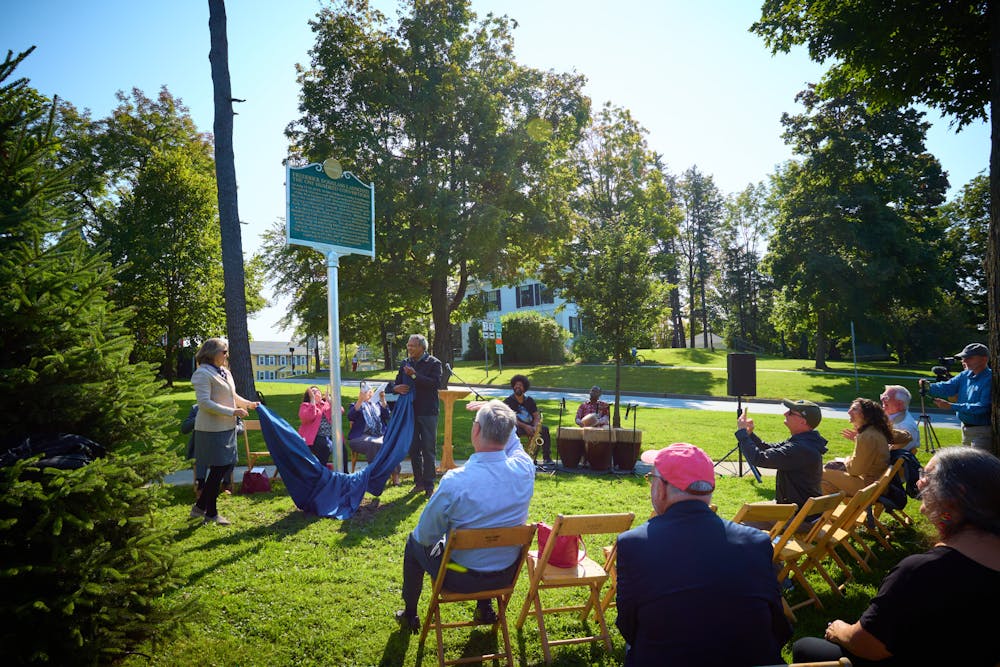A historic marker in Court Square in downtown Middlebury commemorating Frederick Douglass’s visit to the town in 1843 was recently revealed by Professor of History Emeritus Bill Hart and Town Manager Kathleen Ramsey. The ceremony took place 180 years after his visit, on Sept. 22, 2023.
Hart proposed the installation of a plaque commemorating Douglass’ visit to the Middlebury selectboard last year, which they approved by a unanimous vote.
“I urge the town of Middlebury and the state of Vermont to acknowledge officially this critically important moment in our history,” Hart wrote in his proposal for the plaque to the town selectboard.
Douglass’ visit to Middlebury took on greater significance because it was the first stop on the New England Anti-Slavery Society’s ‘100 Conventions’ tour, which aimed to foster opposition to slavery among northerners in the 1840s, according to Hart’s proposal.
Douglass’ reception in Middlebury was far from welcoming, according to Hart. Douglass even referenced the initial hostility he faced here in his autobiography, “Life and Times of Fredierick Douglass,” stating that his reception was initially “intensely bitter and violent,” mostly due to the reactions of anti-abolitionist Middlebury College students. However, as Hart mentioned in his speech at the unveiling ceremony, while he was visiting Middlebury Douglass was able to change the attitudes of many with his speech about his enslavement and act of self-emancipation.
Yet this speech had not been previously commemorated in the Middlebury area until now, despite Hart’s long standing desire for some recognition of the event’s significance, according to reporting from the Addison Independent.
“I believe the marker is important for how passersby — Middlebury residents and visitors alike — understand the history of the spaces they move on and through, particularly the town of Middlebury and its relationship to the broader histories of enslavement and anti-Blackness, as well as struggles against these,” Daniel Silva, associate professor of Luso-Hispanic Studies and director of the Twilight Project, wrote in an email to The Campus.
The historic marker also helps to bring awareness to Alexander Twilight’s graduation from Middlebury College in 1823, which was recently commemorated at the 2023 Clifford Symposium. Twilight was the first documented African American to earn a degree from an American college. After graduation, he went on to become an ordained minister, educator and member of the Vermont House of Representatives, making him the only African American ever to be elected to a state legislature prior to the Civil War, according to the Addison Independent.
“I want those at the symposium to not only learn more about Twilight and his accomplishments, but also to think about race more creatively and more critically. And I hope in thinking about race in more complex ways, we as a society move away from viewing ‘Whiteness’ as a norm — as the standard — by which we assign racial identity to others, especially biracial individuals,” Hart told the Addison Independent. This is particularly relevant given the fact that Hart believes Twilight to be about a quarter Black, and never identified as such during his time at Middlebury making his racial identity a point of interest to some invested in his legacy.
“I think if Douglass could have been alive these last 20 years, he would have thought, ‘This is the Vermont I know.’ I think Douglass would have felt affirmed in his original understanding and belief of what Vermont and Vermonters stood for,” Hart said in the same interview.
Silva noted that the insularity of Middlebury may act as a barrier for understanding Vermont’s histories with racism and white supremacy, both of which Douglass encountered when he visited and spoke at Middlebury.
“In this regard, I hope the marker makes passersby think not just of the anti-Blackness of Douglass’s time, but also how anti-Blackness is manifested in so many ways today,” Silva wrote. “I hope the plaque also invites people to ponder broader investments in whiteness, particularly whiteness in Vermont as a settler colony that continues to hinge on Indigenous dispossession and forms of Black unfreedom, locally and globally.”




